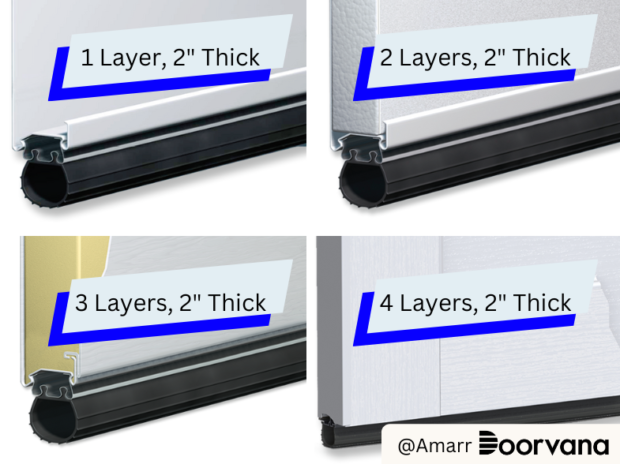Are you shopping for energy-efficient garage doors? If so, it’s important to learn about the different types of insulation. We cover questions about popularity, R-values, and pricing in this article. We aim to help you understand your insulation options and buy the right garage door.
Why is insulation important for a garage door?
Insulated garage doors can improve your home’s efficiency, regulate the garage temperature, and help dampen external noises.
What are the cons of buying an insulated garage door?
Price. From a pure cost standpoint, insulated garage doors cost more than single-layer doors. Different types of insulation and backings will impact the price. For example, the Amarr Classica is available in three options. Non-insulated, vinyl-backed with polystyrene insulation, and steel-backed with polyurethane insulation.
How much is an insulated garage door?
For pricing purposes, we used the Amarr Classica garage door series. Built three separate ways, with varied insulation options, this will give you an idea of how insulation impacts garage door pricing.
Model Size Insulation Price Range Amarr Classica 1000 8x7 None $1,900 - $2,300 Amarr Classica 2000 8x7 Double-layer, 24ga with Vinyl-backed Polystyrene insulation $2,200 - $2,600
Amarr Classica 3000 8x7 Triple Layer - 2" 25/27ga with polyurethane insulation $2,700 - $3,100 Excludes installation, tax, & delivery. Base door. White doors without glass.

What are the different types of insulation available for garage doors?
Polystyrene and polyurethane are the most common types of insulation used in garage doors.
- Polystyrene comes in foam panels cut to size and sandwiched between layers. Garage doors with polystyrene have a vinyl-backed interior. The typical system R-value for polystyrene ranges from 4.23-6.65. The range depends on the thickness.
- Polyurethane provides a better R-value but costs more. It’s only available on premium garage door models and has a steel backing. Polyurethane is a better insulator but may not be worth the added cost.
Which insulation is better?
Polyurethane insulation outperforms polystyrene. It provides a higher R-value and fills voids between layers better. Polyurethane is a liquid spray that expands between cavities. Polystyrene is cut to size and placed between framing layers.
Both provide good soundproofing benefits and added rigidity to your garage door.
Can you install it yourself?
DIY garage door insulation involves purchasing insulating material and cutting it to fit. Once cut to size, attach the insulation inside the garage door with adhesive or screws. Make sure the insulation isn’t exposed to the elements.
Where to buy garage door insulation?
If you want to insulate an existing garage door, you can buy an insulation kit from a hardware or online retailer. These kits may include reflective foam or foil you secure inside your garage door. Once installed, it should stay out of your garage door. If you want to learn more, Bob Vila identified the top home insulation kits.
- Garage Door Insulation Kit from Home Depot
- Polystyrene Garage Door Insulation from Lowe’s
- Reflective Foil Insulation from Amazon
- Insulation Kit from Amazon
Does it make your door heavy?
Most after-market insulation kits are so light that they don’t impact your springs or opener. However, buying a new garage door with insulation can be significantly heavier than one without. The weight depends on whether your garage door has vinyl or steel-backed finish.
In closing
The best insulation for garage doors provides a high R-value and is within your budget. If you still have questions, call us at 817-500-5988.

